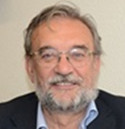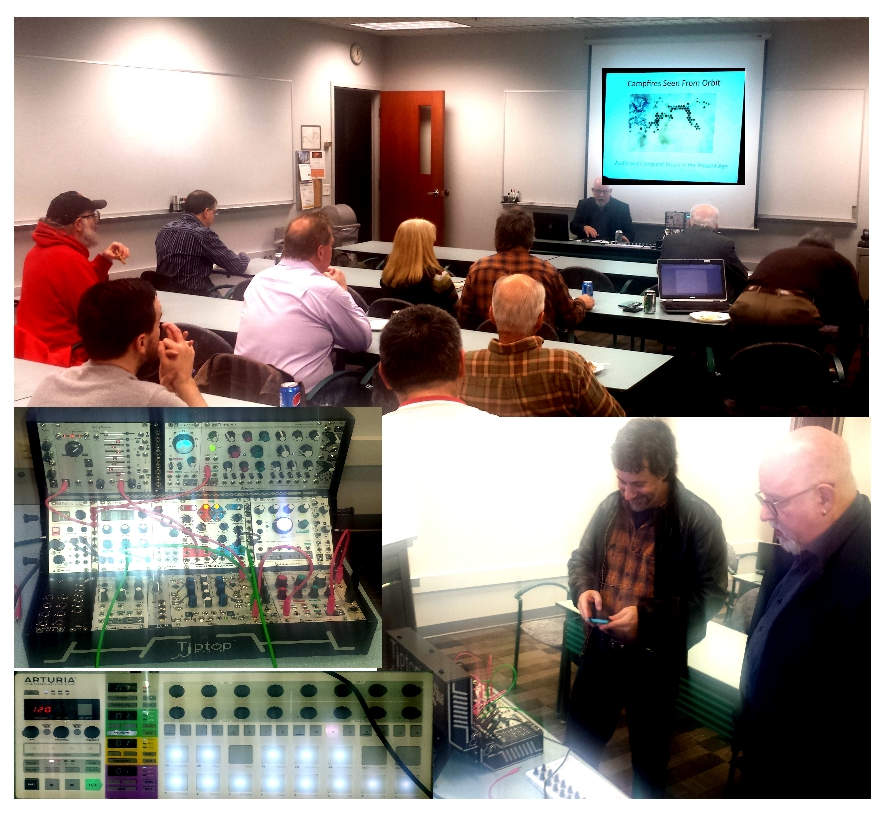

|
Madison Section NewsletterNewsletters are archived online at http://ieee-msn.truenym.net/news.html. |
| Vol. 19, No. 1 | Serving IEEE Members of South Central Wisconsin | January 2016 |


December Section Meeting "Audio and Computer music in the Present Age": (Review by Charles Gervasi) Greg Taylor's talk was called “Campfires Seen from Orbit” because it approached the subject from a philosophical view of how electronic music fits into music over human history. When Max, an early music creation software, started 36 years ago, it required a whole room of computing equipment to run. Now it runs easily on a laptop, making modern musicians think of a laptop as an essential musical instrument. New technology tends to affect music in unforeseen ways. Originally someone put a microphone on a guitar to make it louder. Imperfections like clipping or feedback became part of music and became more important than the original purpose of adding a mic. There is a modern type of music called Congotronics that uses older electronics repurposed playing traditional music from the Congo in completely new ways.

Photo: Greg Taylor's Section Meeting Talk:
"Campfires Seen from Orbit: Audio and Computer Music in
the Current Age"
 The Institute of Electrical and
Electronics Engineers or IEEE (read Eye-Triple-E) is an international
non-profit, professional organization dedicated to advancing
technology innovation and excellence for the betterment of humanity.
IEEE and its members inspire a global community through IEEE's highly
cited publications, conferences, technology standards, and
professional and educational activities. It has the most members of
any technical professional organization in the world, with more than
300,000 members in around 150 countries. The IEEE consists of 38
societies, organized around specialized technical fields, with more
than 300 local organizations that hold regular meetings. Discover what
IEEE Member Discounts can offer you. The Member Discounts portfolio
consists of insurance products and programs for the home, office and
travel, all at excellent group rates and reduced pricing. Visit IEEE
Member Discounts to see what’s available in your location and enjoy
the savings. For more information, please visit: IEEE.ORG.
The Institute of Electrical and
Electronics Engineers or IEEE (read Eye-Triple-E) is an international
non-profit, professional organization dedicated to advancing
technology innovation and excellence for the betterment of humanity.
IEEE and its members inspire a global community through IEEE's highly
cited publications, conferences, technology standards, and
professional and educational activities. It has the most members of
any technical professional organization in the world, with more than
300,000 members in around 150 countries. The IEEE consists of 38
societies, organized around specialized technical fields, with more
than 300 local organizations that hold regular meetings. Discover what
IEEE Member Discounts can offer you. The Member Discounts portfolio
consists of insurance products and programs for the home, office and
travel, all at excellent group rates and reduced pricing. Visit IEEE
Member Discounts to see what’s available in your location and enjoy
the savings. For more information, please visit: IEEE.ORG.
